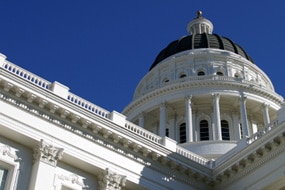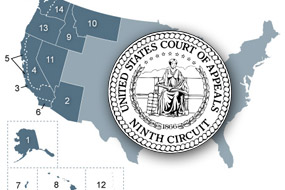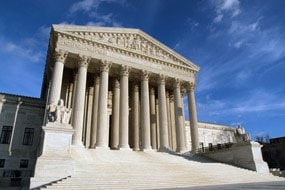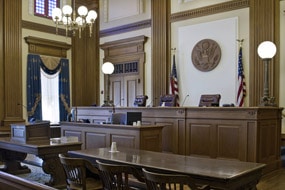Appeals
 The Sacramento and Los Angeles appeal attorneys at Kassouni Law understand how frustrating it can be when the desired result is not obtained. However, often, a case does not end at the trial court level. In many cases, erroneous trial court judgments can be reversed on appeal. The strategy for each appellate client at Kassouni Law is twofold. First, our research attorneys develop legal points based on subtle nuances within the law. From there, the appellate litigation team composes and presents clear and forceful arguments in your favor to the appellate court.
The Sacramento and Los Angeles appeal attorneys at Kassouni Law understand how frustrating it can be when the desired result is not obtained. However, often, a case does not end at the trial court level. In many cases, erroneous trial court judgments can be reversed on appeal. The strategy for each appellate client at Kassouni Law is twofold. First, our research attorneys develop legal points based on subtle nuances within the law. From there, the appellate litigation team composes and presents clear and forceful arguments in your favor to the appellate court.
Kassouni Law has a reputation in the industry for honestly and objectively evaluating the merits of an appeal and its chances for success. This evaluation in most cases is offered at an affordable flat fee.
Contact a Los Angeles Appeals Attorney
Contact a Sacramento Appeals Law Firm
Selecting the right appeal lawyer can be the key to prevailing on appeal. As you proceed in your selection, our Sacramento and Los Angeles appeals attorneys offer some suggestions and tips for your consideration:
When your case is heard in trial court the judge or jury weighs the evidence presented, and assesses the credibility of witnesses. As the case reaches the appellate court, factual issues and witness credibility are usually no longer considered. With limited exception, the arguments that are made in the court of appeal must also have been addressed in the trial court. The appeal focuses primarily on the law and its correct interpretation and application. For this reason, an appeal must make a compelling case that the trial court made an error of law and that the law is on your side.
It is important that trial counsel also be experienced in appellate litigation, and that your appellate lawyer has a full grasp of the legal issues involved. Your appellate lawyer must comprehensively understand the law so thoroughly that he or she will be able to present new and subtle nuances within the law as clear and forceful arguments in your favor. As experienced Los Angeles Appeal Attorneys, Kassouni Law can provide you with the proper counsel.
The Sacramento appeals Law Firm and Los Angeles Appeals Attorneys at Kassouni Law also provide practical assistance in determining whether an appeal has merit, and the likelihood of success. Our appeal lawyers take pride in providing clients with an objective analysis. In some instances, the likelihood of success in overturning an adverse trial court judgment is minimal, and not worth the expense of an appeal. In other instances the trial court made an obvious error of law which maximizes the likelihood of success in the court of appeal.
Fighting for Your Rights
At Kassouni Law we have a team of research attorneys with a thorough command of the law. Our Sacramento and Los Angeles appeals attorneys have extensive experience representing clients at all appellate court levels, and also have comprehensive trial court experience. If you or your business suffered an adverse trial court ruling, or received a favorable trial court ruling which you want to uphold on appeal, consider calling us for a consultation. You can count on the appeal lawyers at Kassouni Law to listen to your legal concerns, give an honest assessment of your case’s legal merits, and deliver unparalleled personalized legal representation. Contact our Sacramento Appeals law firm or the Los Angeles office for an initial evaluation by calling (877) 770-7379.
The Sacramento Appeals law firm and Los Angeles appeals attorneys serve clients throughout the jurisdiction of California, the Federal Ninth Circuit Court of Appeals, and the United States Supreme Court.
 California Civil Appeals
California Civil Appeals
A California state court civil appeal differs from a federal civil appeal in that the case originates in a state trial court. If a case originates in a federal district trial court, the appeal is brought before the Ninth Circuit Court of Appeals. See Federal Civil Appeals for more information on the federal appeals process. A California state court appeal is triggered by the service of a notice of entry of judgment. From the date of service the appellant has 60 days to file a notice of appeal. Parties should be aware that a notice of appeal is a very short, straightforward document that specifies the name of the appellant, the date of the entry of judgment, and usually an affirmation that the judgment is a final adjudication of all issues between the parties.
 Federal Civil Appeals
Federal Civil Appeals
The federal appeal process begins with the issuance of a judgment by a federal court judge. From the date of entry of the judgment you will have 30 days to file a notice of appeal. Federal jurisdiction is most commonly triggered if there is a case involving a provision of the United States Constitution, a federal statute, a bankruptcy issue, or a dispute between citizens of different states in an amount exceeding $75,000. Disputes involving Constitutional or federal statutory provisions give the federal district court subject matter jurisdiction, whereas disputes involving citizens of different states give the federal district court diversity jurisdiction. The Federal Court of Claims is also the exclusive forum for cases for damages against the United States government. For example, all claims against the United States government for a taking of property without just compensation must be brought in the Court of Claims. Owner, Timothy V. Kassouni is admitted in all California federal courts, as well as the Court of Claims.
- California Federal Appeals
- Montana Federal Appeals
- Washington Federal Appeals
- Oregon Federal Appeals
- Alaska Federal Appeals
- Nevada Federal Appeals
- Hawaii Federal Appeals
- Idaho Federal Appeals
- Arizona Federal Appeals
- US Trust Territory of Guam Appeals
- US Commonwealth of the Northern Mariana Islands Federal Appeals
 Strategy for Appeal
Strategy for Appeal
One of the most common methods of overturning a jury verdict on appeal is the erroneous [gs jury instruction]. In some instances the judge provides the jury with instructions that do not accurately state the elements of the claim or the affirmative defense, or leaves out one of the essential elements. This is a classic error of law, which the court of appeal will examine. The court of appeal will not defer to the trial court’s conclusion, but rather will examine the legal issue from the ground up. This is called [gs de novo] review. The appeal attorneys at Kassouni Law recognize that litigation is time consuming and costly. By the time a case reaches the appeal process, it is important (as with any stage of the litigation) to implement legal strategies to mitigate time and cost to clients.
 Winning an Appeal
Winning an Appeal
Kassouni Law offers a team of Los Angeles and Sacramento-based research attorneys with a thorough command of the law. Our appeal lawyers have extensive experience representing clients at all appellate court levels, and have comprehensive trial court experience. If you or your business suffered an adverse trial court ruling, or received a favorable trial court ruling which you want to uphold on appeal, please consider calling us for a consultation. You can count on the appeal lawyers at Kassouni Law to listen to your legal concerns, give an honest assessment of your case’s legal merits, and deliver unparalleled personalized legal representation.
 Court of Appeal Writ Proceedings
Court of Appeal Writ Proceedings
Within the process of appeals, occasionally, legal strategy calls for a lawyer to file a writ to seek the aid of the court of appeal before there is even a final judgment in the case. These are called writ proceedings. A writ is essentially an order from the Court commanding a private or governmental entity to do something. Writs are another non-monetary remedy available to a plaintiff. In many instances, California statutes require one to file a lawsuit with a writ cause of action. If you or your business would like a legal strategy assessment or evaluation as to whether or not a writ is the best way to proceed in your legal matter, consider calling the Sacramento and Los Angeles appeal and writ lawyers at Kassouni Law for a consultation.
 Stages of an Appeal
Stages of an Appeal
There are three stages to the appeal process. First, the attorney for the appellant must file a document called a notice of appeal in the trial court within 60 days of judgment, and then designate the record. The record consists of transcripts of court proceedings and the pertinent trial court documents. Once the record is finalized, which usually takes three months or longer depending on the size of the record, the second stage begins: the court of appeal will notify counsel that the appellant’s opening brief is due. Again, with limited exception, no new arguments can be introduced that were not first raised in the trial court. The opening brief consists of the arguments and supporting evidence presented by the appellant. Once the appellant’s opening brief is filed, the respondent will file his or her brief within several months. The final brief is the appellant’s reply, which must be limited to rebutting the arguments raised by the respondent. This briefing process typically takes four to five months to complete.
 Appeal without Trial Proceedings
Appeal without Trial Proceedings
In certain circumstances, cases can resolve in the trial court before there is even a jury or court trial. There are two primary circumstances in which this occurs. Cases are often resolved through a legal proceeding called a [gs Motion for Summary Judgment]. In this proceeding, the court will issue a judgment for the plaintiff or the defendant on the grounds that there are no material factual disputes, and that the matter can be decided by the court as a matter of law. If there are material factual disputes, the court cannot issue a summary judgment. It is vitally important to retain an attorney who understands the intricacies of the summary judgment and [gs demurrer] process. On appeal, the attorney can explore all of the deficiencies in the grant of summary judgment, or, alternatively, defend the grant of summary judgment. The attorneys at Kassouni Law have substantial experience in the intricacies of summary judgment and demurrer proceedings.
Results & Experience
Timothy Kassouni at Kassouni Law has extensive appellate experience including the following published opinions:
City of West Hollywood v. Beverly Towers, California Supreme Court [amicus curiae briefing and oral argument];
Long Beach Equities, Inc. v. County of Ventura, California Court of Appeal [amicus curiae briefing];
Golden Gate Water Ski Club v. County of Contra Costa, California Court of Appeal [lead counsel]
Leroy Land Development v. Tahoe Regional Planning Agency, Ninth Circuit Federal Court of Appeals [amicus curiae briefing and oral argument]
Lucas v. South Carolina Coastal Council [amicus curiae briefing before the South Carolina Supreme Court and the United States Supreme Court. The United States Supreme Court granted certiorari of this decision, which led to the landmark Fifth Amendment decision outlining the parameters of a categorical inverse condemnation taking].

